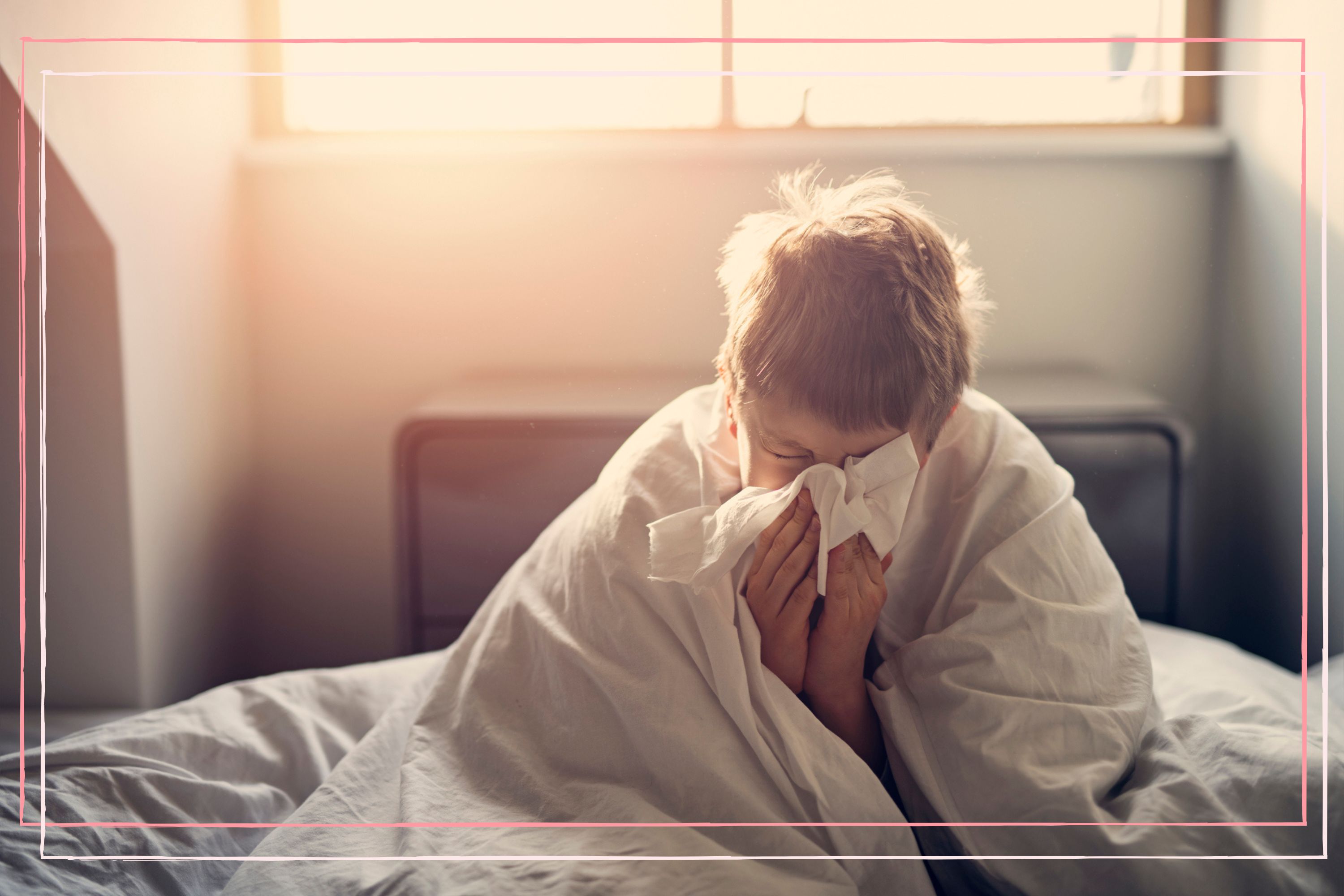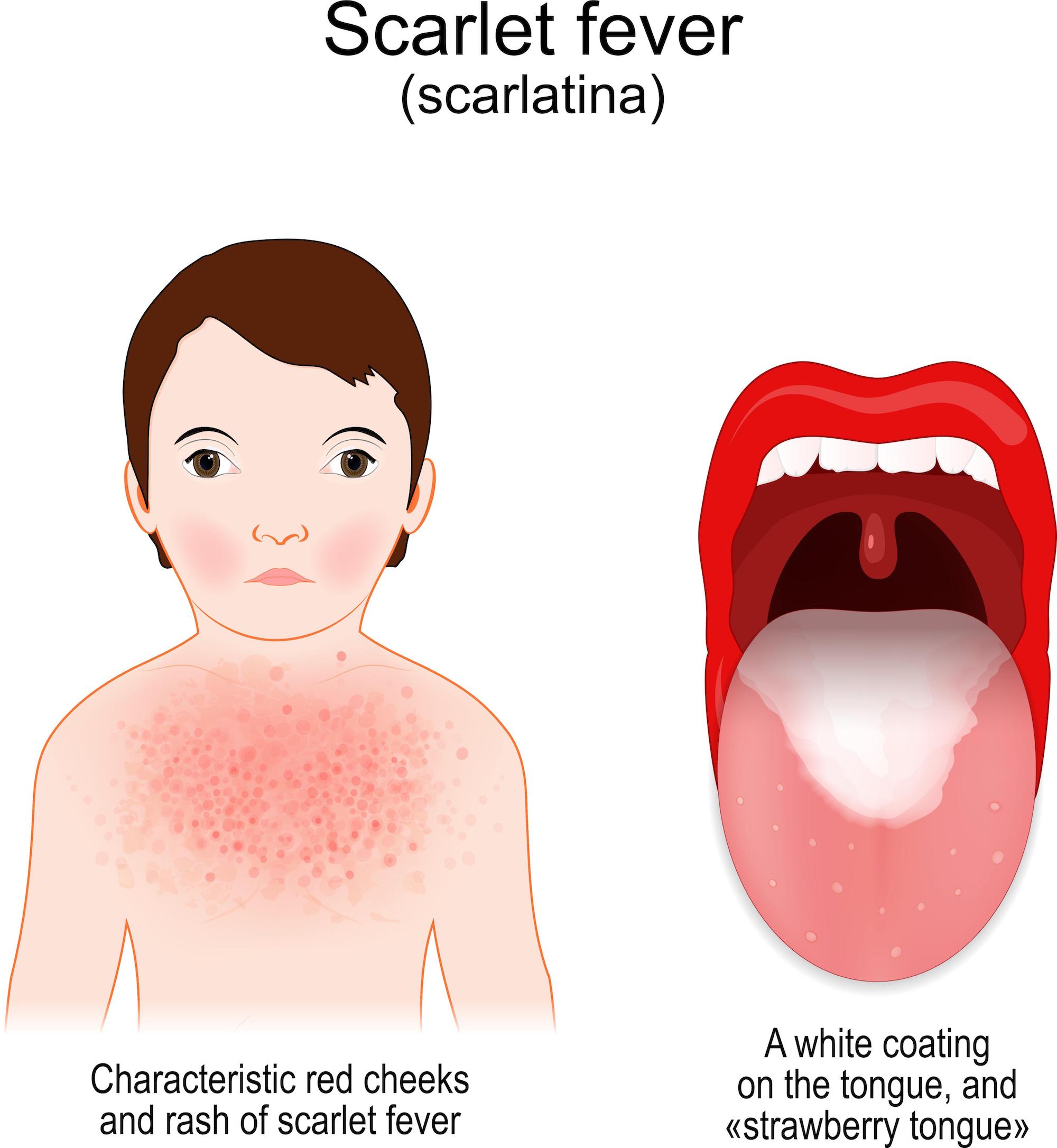
Scarlet fever might sound like an illness straight out of a Charles Dickens novel but in actual fact it’s still a common illness among young children in the UK.
The UK Health Security Agency states, "Scarlet fever is mainly a childhood disease, with around 90% of cases occurring in children under 10 years old." It is a highly contagious disease which is also notifiable, which means each case has to be reported to the Director of Public Health who monitors outbreaks or clusters. The agency says the disease is most common in children aged between two and eight and Public Health England state that scarlet fever occurs most often in the winter and spring.
We consulted GP and founder of Say GP Dr Semiya Aziz (MRCGP), NHS GP Dr Hana Patel (FRCGP) and GP Dr Alexis Missick (MRCGP), to find out more about what you should do if your child has scarlet fever and to answer some frequently asked questions about the illness.
The information in this article is for general purposes only and does not take the place of medical advice. It is essential to be guided by your GP and take note of official NHS advice. You should immediately seek medical attention if symptoms worsen or you are concerned about your child. If you are unsure, concerned about their symptoms or a rash that has appeared, then it is crucial to seek personalised advice from a doctor as soon as possible.
What is scarlet fever?
Scarlet fever is caused by a bacteria called Streptococcus pyogenes, or group A streptococcus (GAS) - the same bacteria that can cause impetigo - and it’s very infectious.
The key symptoms are a temperature, a rash that feels like sandpaper to touch, sore throat, a swollen white tongue and red cheeks. The red cheeks symptom can be confused for slapped cheek syndrome and the scarlet fever rash can be confused with measles, so if you haven’t already, it’s important that you contact your GP immediately if you think you or your child has scarlet fever.
A GP will usually diagnose scarlet fever from the symptoms alone but the UK Health Security Agency adds, "The diagnosis can be confirmed by taking a throat swab, which is then sent to a laboratory to identify the bacteria causing the infection. In some cases, a throat swab is not enough and a blood test may be needed."
Parenting advice, hot topics, best buys and family finance tips delivered straight to your inbox.
The government website also states: "Most mild cases of scarlet fever will clear up on their own, but it is still best to see your GP if you, or your child, are showing symptoms."
You will need to check with your GP surgery over the phone before you take your child in because scarlet fever is very contagious. They may ask you to go in a different entrance or not wait in the reception area, to reduce the risk of spreading the infection.
A GP will usually prescribe a course of antibiotics for a child with scarlet fever and this will bring down the fever, help with other symptoms and stop your child from passing it on.
Dr Patel adds, "The fever should disappear within 24 hours of starting antibiotics and the other symptoms should go within a couple of days. The rash usually fades after about a week. Treatment is important as it reduces the risk of developing complications."

The scarlet fever rash looks like small, raised bumps and starts on the chest and tummy, then spreads. The rash makes skin feel rough, like sandpaper. A white coating also appears on the tongue. This peels, leaving the tongue red, swollen and covered in little bumps (called "strawberry tongue").
How contagious is scarlet fever?
Scarlet fever is very contagious, so as soon as you suspect your child has the disease you will need to keep them at home and away from other people, especially anyone with a compromised immune system.
It's spread through mucus and saliva, which is why it's more common in the winter months as coughing and sneezing is more prevalent.
Dr Aziz says, "Scarlet fever is extremely contagious and spreads through respiratory droplets during coughing or sneezing and through the direct contact of contaminated surfaces."
Dr Missick also emphasises the importance of taking the prescribed course of treatment from your GP as it will help your child become non-contagious more quickly, "Your child can spread scarlet fever to others until 24 hours after they have had their first dose of antibiotics. If they don’t take antibiotics, they are infectious for 2 to 3 weeks from their symptoms starting."
How long does my child have to stay off school?
If you suspect your child has scarlet fever then the NHS advise keeping them off school and nursery. Even once antibiotics have started to treat the condition they advise staying off for at least a further 24 hours following the first dose of antibiotics, to minimise risk of spreading.
Dr Missick agrees saying, "You should keep your child at home until they’ve been on antibiotics for at least 24 hours and are no longer considered contagious." This advice reflects the current government guidance that states, "children should not return to nursery or school, and adults to work, until a minimum of 24 hours after starting antibiotic treatment."
Sending your child back to school will of course depend on how they’re feeling. If they’re very lethargic and not eating and drinking much then they’re probably not physically up to being in school until this passes.
Your child’s school should be informed if they are diagnosed with scarlet fever by a GP, as the school will have its own protocols to follow for confirmed cases.
How can I reduce the risk of spreading it?
As well as keeping your child at home, Dr Aziz says there are lots of other ways of preventing the spread of scarlet fever. She recommends maintaining normal good hygiene methods such as washing your hands with soap and water, especially after coughing or sneezing and covering your mouth at these times too. Children should be encouraged to cover their mouth and nose when sneezing and wash their hands thoroughly with warm water and soap after disposing of their tissue.
She also recommends, "isolating the individual diagnosed with scarlet fever from others, to avoid the spread, at least until they have been commenced on oral antibiotics for a period of 24 hours."
It is also a good idea to avoid sharing things which could be contaminated; like cups, glasses and cutlery, as well as bed linen and towels. Using disinfectant on common surfaces may also reduce the spread.
The UK Health Security Agency states: “You can help stop the spread of infection through frequent hand washing and by not sharing eating utensils, clothes, bedding and towels. All contaminated tissues or handkerchiefs should be washed, or disposed of immediately.
Is scarlet fever dangerous for pregnant women?
While scarlet fever is more common in children, adults can still get it - including pregnant people. However, according to the NHS, there's no evidence the condition can put unborn babies at risk.
Dr Patel explains, "There's no evidence to suggest that getting scarlet fever during pregnancy will harm your baby. But it can make you feel unwell, so it's best to avoid close contact with anyone who has it."
The NHS advises contacting your GP if you are pregnant and get symptoms of scarlet fever.
Their website also states, "Many of the antibiotics used for scarlet fever are considered to be safe to take during pregnancy."
How can I soothe a child that has scarlet fever?
A child with scarlet fever is going to need some extra cuddles and care as they might be feeling quite poorly.
Dr Missick says, "If your child has a sore throat, drinking cool fluids and [eating] soft foods can help soothe them. Calamine lotion or antihistamine tablets can also be used to reduce itching." Speak to your GP or a pharmacist about which lotions or antihistamine products are suitable for babies and infants.
When should you seek further support?
If you think you or your child has scarlet fever, you should consult your GP.
Complications from scarlet fever are rare and most cases will have no complications at all.
However, complications can happen during or in the weeks after the infection, and can include (but are not limited to) ear infections, sinusitis, pneumonia and meningitis. Government advice is to keep an eye out for any symptoms which might suggest there are complications in the first few weeks after the main infection has cleared up and, if concerned, seek medical help immediately.
The NHS advises that you should see your GP if you or your child:
- have scarlet fever symptoms
- do not get better in a week (after seeing a GP)
- have scarlet fever and chickenpox at the same time
- are ill again, weeks after scarlet fever got better – this can be a sign of a complication, such as rheumatic fever
- are feeling unwell and have been in contact with someone who has scarlet fever
You should always seek medical advice if you're worried about your baby or child. Speak to a GP if you are concerned about scarlet fever or possible complications.
Answers to your frequently asked questions about scarlet fever
How long does scarlet fever last in children?
Scarlet fever usually lasts about one week.
Mild cases of scarlet fever can clear up on their own but it is advisable to speak to your GP to get a full diagnosis and the proper treatment to help speed up recovery and reduce the risk of complications.
Should a family isolate if a child has scarlet fever?
Household contacts of scarlet fever patients are also at risk of developing scarlet fever or other infections caused by the same bacteria. Although people of all ages can catch scarlet fever, the disease is far less common in adults.
If other household members present with symptoms of scarlet fever such as a sore throat, mild fever or minor skin infection, make sure to speak to your GP straight away and stay at home until you have a diagnosis and advice from your doctor.
Dr Missick says, "You should keep your child at home until they’ve been on antibiotics for at least 24 hours and are no longer considered contagious. The family of a child with scarlet fever should take precautions such as practising good hand hygiene and avoiding close contact until the contagious period has passed."
Dr Missick also suggests that, "it may be best to stay at home" if a child or family member has scarlet fever, "until they are no longer contagious" but she also acknowledges, "this may depend on your circumstances and employer."
Can a sibling of a child with scarlet fever go to school?
Dr Missick explains that if a child is not showing any symptoms of scarlet fever, and hasn’t been diagnosed with the infection, then it should be okay for them to go to school. She recommends monitoring them for any signs of scarlet fever, and taking them to the doctor and keeping them at home if they do start to feel unwell.
You should make your child’s teacher aware that they have a sibling who has contracted scarlet fever before sending them in and you can always consult the school directly if you’re unsure.
Can my child go to school if they still have the scarlet fever rash?
A rash from scarlet fever usually takes around seven days to fade. So as long as your child has been kept at home for 24 hours after taking their first dose of antibiotics, and provided they feel well enough, they should be able to return to school, even if the rash hasn’t fully faded yet.
Dr Missick says, "The most important thing to consider is the antibiotics timeline, instead of the presence of a rash, as this affects how long they are infectious for."
Can a child catch scarlet fever twice?
Having had scarlet fever already doesn't make your child immune to future scarlet fever infections. However, it’s unlikely your child will get scarlet fever twice. All of our experts were in agreement on this and say it is “rare” for a child to catch scarlet fever twice.
The information on GoodTo.com does not constitute medical or other health advice or diagnosis and should not be used as such. Although GoodtoKnow consults a range of medical experts to create and fact-check content, this information is for general purposes only and does not take the place of medical advice. Always seek the guidance of a qualified health professional or seek urgent medical attention if needed.
Our experts

Dr. Semiya Aziz is a seasoned general practitioner with over 20 years of experience as a GP in both the NHS and in private practice. She first obtained her degree in microbiology from Queen Mary University of London, and subsequently, she obtained her MBBS from The Royal London Hospital. She is a member of the Royal College of General Practitioners and the British Society of Lifestyle Medicine. She is also registered with the Care Quality Commission (CQC) and the General Medical Council (GMC).

Dr Hana Patel is a versatile and experienced general practitioner in family medicine, and a life and mental health coach based in the Southeast London area. She first received her medical degree in 2005 from The University of London, and continued to further her medical qualifications through rigorous trainings and degrees. Dr Patel has trained with institutions such as King's College London, University of London, and University of Kent. In 2010, she received her qualification from The Royal College of General Practitioners (RCGP).

Alexis is an experienced General Practitioner (GP) having worked over 10 years in the NHS and 6 years internationally, mostly the Caribbean - namely Turks and Caicos where she is originally from. Alexis' approach in general practice is to holistically treat and empower patients via patient education, to share in their journey to better physical health. Alexis also works with UK Meds.

Kat has been a digital journalist for over 15 years after starting her career at Sky News where she covered everything from terror attacks to royal babies and celebrity deaths. She has been working freelance for the last five years and regularly contributes to UK publications including Stylist, ES Best, Woman&Home, Metro and more.
